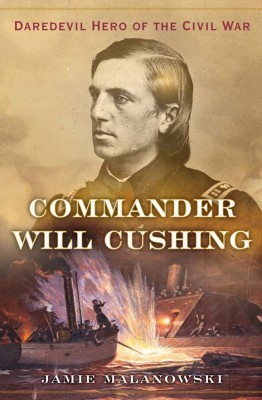Jamie Malanowski's Blog, page 5
June 26, 2014
THE EARLY BLURBS
 There is in publishing the fine old tradition of blurbing, in which the author of a book, and/or his agent and/or his editor, contact certain friends and associates who might be predisposed to like a new book, and to ask them to read the book and, if they like it, to write a short statement of appreciation. Th exercise is rather like going to a christening party. All guests are expected to say nice things about the baby, so a certain amount of praise must be automatically discounted. At the same time, there is a way to artfully offer tepid praise that rare unattractive baby. Well, the blurbs are in, and I’m happy to say, even with the praise appropriately discounted, Commander Will Cushing: Daredevil Hero of the Civil War, has been met with enthusiasm.
There is in publishing the fine old tradition of blurbing, in which the author of a book, and/or his agent and/or his editor, contact certain friends and associates who might be predisposed to like a new book, and to ask them to read the book and, if they like it, to write a short statement of appreciation. Th exercise is rather like going to a christening party. All guests are expected to say nice things about the baby, so a certain amount of praise must be automatically discounted. At the same time, there is a way to artfully offer tepid praise that rare unattractive baby. Well, the blurbs are in, and I’m happy to say, even with the praise appropriately discounted, Commander Will Cushing: Daredevil Hero of the Civil War, has been met with enthusiasm.
“Commander Will Cushing is a happy combination of one of the Civil War’s best tales and a writer those taut, smart prose is up to the task of writing it. So much Civil War writing loses its luster in a an ocean of sheer data. In Malanowski’s hands the narrative just drives forward, carrying you with it. A superbly entertaining book on a subject that, somehow, everyone else overlooked.” — S.C. Gwynne, author of Empire of the Summer Moon
“Jamie Malanowski has brought to life one of the great, little-known swashbucklers of the Civil War. A fun, exhilarating rush of a read, this is history told with the flair and panache of a great journalist.” — Nathaniel Philbrick, author of Sea of Glory, The Mayflower and Bunker Hill
“A terrific book! It’s astonishing to me that I’d never heard of such an astonishing and very American hero. Will Cushing is like a character out of fiction or the movies — charismatic trouble-maker, patriot, half-mad can-do leader of men — and Jamie Malanowski beautifully tells the ripping yarn that was his remarkable life.” — Kurt Andersen, author of True Believers and Heyday
“Union Navy Commander Will Cushing’s sinking of the Confederate ironclad CSS Albemarle in October 1864 with a small, makeshift torpedo boat is one of the greatest and, until now, least known feats of daring in American naval history. Author Jamie Malanowski restores Cushing to his proper place in the first rank of American naval heroes in this fast-paced, rousing biography that illuminates both Cushing the man and the hero. Gracefully written and admirably nuanced, Commander Will Cushing makes a significant contribution to the naval history of the Civil War. ” — Peter Cozzens, author of Shenandoah 1862: Stonewall Jackson’s Valley Campaign, among other works
“Jamie Malanowski’s compelling history sheds new light on Will Cushing, a major naval hero of the Civil War. . . [who performed] one of the most extraordinary single-handed feats of the war.. The Cushing name reverberates through those years, with four brothers serving the North, including Alonzo, a cannoneer who fell at Gettysburg. . . But this story is about Will, and it’s a corker.” — Larry Smith, author of Beyond Glory: Medal of Honor Winners in Their Own Words
BELTRAN BELTS ONE!
 Thanks to the largesse of my daughter Molly, our newest friend Shawn Kelly and I (that’s us below, flanking Mister Balloonhead) got to go to see the Yankees and Orioles on Friday, June 20th. Shawn, who is very knowledgeable about baseball (although this appears to be way down on the list of things he knows about, following hockey and fishing and other topics) predicted that the game could be a pitchers’ duel, and for most of the game, he was right–Hiroki Kuroda no-hit the O’s for five innings, while Ubaldo Jiminez allowed the
Thanks to the largesse of my daughter Molly, our newest friend Shawn Kelly and I (that’s us below, flanking Mister Balloonhead) got to go to see the Yankees and Orioles on Friday, June 20th. Shawn, who is very knowledgeable about baseball (although this appears to be way down on the list of things he knows about, following hockey and fishing and other topics) predicted that the game could be a pitchers’ duel, and for most of the game, he was right–Hiroki Kuroda no-hit the O’s for five innings, while Ubaldo Jiminez allowed the  Yanks to load the bases in three innings while yielding just one run. Baltimore moved ahead, and the lackluster Yanks entered the bottom of the ninth trailing 3-1. But Brett Gardner got on, and after two outs, so did Mark Teixiera and Brian McAnn, bringing Carlos Beltran to the plate. Earlier, the perspicacious Shawn said “If Beltran can get up, we might have a chance.” And so we did. Beltran clobbered a high 3-1 pitch over the leftfield wall, and everyone went home singing New York, New York.
Yanks to load the bases in three innings while yielding just one run. Baltimore moved ahead, and the lackluster Yanks entered the bottom of the ninth trailing 3-1. But Brett Gardner got on, and after two outs, so did Mark Teixiera and Brian McAnn, bringing Carlos Beltran to the plate. Earlier, the perspicacious Shawn said “If Beltran can get up, we might have a chance.” And so we did. Beltran clobbered a high 3-1 pitch over the leftfield wall, and everyone went home singing New York, New York.
May 20, 2014
VICKI, 1998-2014

We said goodbye to our beloved Vicki today. In her 17th year, the chronic conditions of old age finally claimed her. A scourge to squirrels and large trucks, a connoisseur of pizza crusts and cereal milk, a boon companion, Vicki was one of those rare creatures whose pleasure, need and mission were all the same thing: her family. We will miss her always.
VICKI, 1997?-2014

We said goodbye to our beloved Vicki today. In her 17th year, the chronic conditions of old age finally claimed her. A scourge to squirrels and large trucks, a connoisseur of pizza crusts and cereal milk, a boon companion, Vicki was one of those rare creatures whose pleasure, need and mission were all the same thing: her family. We will miss her always.
May 15, 2014
ROUND ROBIN DUETS
 Thanks to a lucky drawing (and, I suspect, lousy ticket sales, ) Dave Jensen and I got to to go to Town Hall to see “A Night of Improvised Round Robin Duets,’part of the Red Bull Music Academy Festival. What we saw were 17 gifted musicians playing a series of duets. The music was mostly jazz and
Thanks to a lucky drawing (and, I suspect, lousy ticket sales, ) Dave Jensen and I got to to go to Town Hall to see “A Night of Improvised Round Robin Duets,’part of the Red Bull Music Academy Festival. What we saw were 17 gifted musicians playing a series of duets. The music was mostly jazz and 
 electronica, and the musicians were, with the exception of the venerable Allen Toussaint (who was practically a classicist in this crowd), were unknown to me. The performances were, in no particular order, interesting, boring, entertaining, beautiful,
electronica, and the musicians were, with the exception of the venerable Allen Toussaint (who was practically a classicist in this crowd), were unknown to me. The performances were, in no particular order, interesting, boring, entertaining, beautiful, 

 >
> unstructured, impenetrable. Some of the stuff was tired–brass players speeding up and down the scales, guitarists atrangling strange, Hendrixian cries of anguish from their instruments. The bits were often best when drummers were involved and providing some structure. The greatest revelation was the singer Petra Hagen, whose voice is powerful, glistening, supple. She is someone I want to learn more about. Pictures: Top: closing jam. Middle pair: Karsh Kale, Kaki King and Jamie Lidell; Petra Haden and James Carter; Bottom four: Trumpeter Dave Douglas; Shigeto; Wadada Leo Smith and James Carter; the great Allen Toussaint.
unstructured, impenetrable. Some of the stuff was tired–brass players speeding up and down the scales, guitarists atrangling strange, Hendrixian cries of anguish from their instruments. The bits were often best when drummers were involved and providing some structure. The greatest revelation was the singer Petra Hagen, whose voice is powerful, glistening, supple. She is someone I want to learn more about. Pictures: Top: closing jam. Middle pair: Karsh Kale, Kaki King and Jamie Lidell; Petra Haden and James Carter; Bottom four: Trumpeter Dave Douglas; Shigeto; Wadada Leo Smith and James Carter; the great Allen Toussaint.
May 9, 2014
AND THE CROWD GOES WILD!
 Momentarily, anyway, after left-winger Carl Hagelin of the New York Rangers tied the score with a nice goal in the second period of Game 4 of the Rangers’ series against the Pittsburgh Penguins. Thanks to my friend Paul Lindstrom (yes, that’s us below, silhouetted against the rink, below), who invited me to join him in his company’s fancy box in Madison Square Garden. This may have been my first time in a box, and the view was much better than I expected–second level seats. Unfortunately, it was a view of lackluster Ranger performance. The team showed little little drive, little fire, checked only intermittently, and authored more turnovers than Sara Lee. Their impotent power play underdid itself and gave up a short handed goal, and then, worse, they gave up an own goal. Awful. The Penguins took a three games to one lead, and are now poised to eliminate the dragging Rangers tonight. (Just for the record, I maintain that that is future Hall of Famers Sidney Crosby and Eugenie Malkin, author of very pretty turnaround
Momentarily, anyway, after left-winger Carl Hagelin of the New York Rangers tied the score with a nice goal in the second period of Game 4 of the Rangers’ series against the Pittsburgh Penguins. Thanks to my friend Paul Lindstrom (yes, that’s us below, silhouetted against the rink, below), who invited me to join him in his company’s fancy box in Madison Square Garden. This may have been my first time in a box, and the view was much better than I expected–second level seats. Unfortunately, it was a view of lackluster Ranger performance. The team showed little little drive, little fire, checked only intermittently, and authored more turnovers than Sara Lee. Their impotent power play underdid itself and gave up a short handed goal, and then, worse, they gave up an own goal. Awful. The Penguins took a three games to one lead, and are now poised to eliminate the dragging Rangers tonight. (Just for the record, I maintain that that is future Hall of Famers Sidney Crosby and Eugenie Malkin, author of very pretty turnaround 
 goal, in the photo at far left.) But who cares? I just enjoyed going into the city, mingling with the crowd, feeling the excitement, , seeing the interesting changes that have been made to Madison Square Garden, hanging with Paul, and eating a decent sausage sandwich without getting heartburn. It was fun!
goal, in the photo at far left.) But who cares? I just enjoyed going into the city, mingling with the crowd, feeling the excitement, , seeing the interesting changes that have been made to Madison Square Garden, hanging with Paul, and eating a decent sausage sandwich without getting heartburn. It was fun!
May 4, 2014
THE IGNORANCE OF JIM DE MINT
 Jim DeMint, the radical right-wing former senator from South Carolina and current Heritage Foundation head appeared on a program called “Vocal Point with Jerry Newcombe of Truth In Action Ministries” in early April, where he insisted that “no liberal is going to win a debate that big government freed the slaves.” Instead, DeMint credited the move to “the conscience of the American people.” Here are his comments:
Jim DeMint, the radical right-wing former senator from South Carolina and current Heritage Foundation head appeared on a program called “Vocal Point with Jerry Newcombe of Truth In Action Ministries” in early April, where he insisted that “no liberal is going to win a debate that big government freed the slaves.” Instead, DeMint credited the move to “the conscience of the American people.” Here are his comments:
DeMint: Well the reason that the slaves were eventually freed was the Constitution, it was like the conscience of the American people. Unfortunately there were some court decisions like Dred Scott and others that defined some people as property, but the Constitution kept calling us back to ‘all men are created equal and we have inalienable rights’ in the minds of God. But a lot of the move to free the slaves came from the people, it did not come from the federal government. It came from a growing movement among the people, particularly people of faith, that this was wrong. People like Wilberforce who persisted for years because of his faith and because of his love for people. So no liberal is going to win a debate that big government freed the slaves. In fact, it was Abraham Lincoln, the very first Republican, who took this on as a cause and a lot of it was based on a love in his heart that comes from God.
When it comes to freeing the slaves, it is impossible to separate the country’s evolving conscience from the political actions of the United States government. Yes, there was an abolitionist movement that underwent tremendous growth during the early 19th century, particularly in the north and midwest. At the same time, a nascent abolitionist movement in the south died out as slaveholders locked up control of the state governments. The secession movement in 1860 was purely the result of of slaveholders wanting a free hand to protect and expand slavery. The war was not a result of an anti-slavery movement, but a pro-union movement. Lincoln was against slavery, but he entered office a moderate abolitionist. Eventually abolition became one of the war aims of the north. Slavery remained a war aim of the south; indeed, even when facing defeat, the southern rejected a proposal to give freedom to any slave who would fight for the confederacy. Yankee troops killing rebel soldiers ended slavery, Yankee troops marching across southern plantations ended slavery, southern states being denied reunion with the north until they abolished slavery ended slavery. No doubt some consciences evolved, but a century of segregation and Jim Crow shows that change was slow, and fedderal, big government action was still needed to help bring freedom in the south.
Of course, the Emancipation Proclamation was a presidential proclamation and the Thirteenth Amendment was initiated by the federal government.
Historian Michael Les Benedict notes that Republicans at the time advocated a “nationalist” view of the Constitution, unlike “the largely state-rights Democratic party.” Abraham Lincoln’s critics, historian Don E. Fehrenbacher points out, pilloried him as a “tyrant” who was “bringing about destruction of the old Union of sovereign states and setting the nation on the road to totalitarianism” by “subverting the rights and powers of the states.” Confederate leaders insisted that the Civil War was a “war waged by the Federal Government against the seceding States.”
Lincoln, in fact, greatly expanded the role of the federal government and signed into law the first federal progressive income tax.
- See more at: http://www.rightwingwatch.org/content...
- See more at: http://www.rightwingwatch.org/content...
THE STRANGE UGLY CASE OF DONALD STERLING
 Just ten short days ago, lawyer/slumlord/billionaire racist Donald Sterling was heard on a covertly recorded tape saying that he didn’t want his mixed-race girlfriend to bring black athletes to L.A. Clippers basketball games. (Among other things: read the full transcript here.) Since then, volumes of outrage were expressed, much of it by NBA players; and NBA commissioner Adam Silver fined him the league maximum $2.5 million, banned Sterling for life, and ordered that he sell the team.
Just ten short days ago, lawyer/slumlord/billionaire racist Donald Sterling was heard on a covertly recorded tape saying that he didn’t want his mixed-race girlfriend to bring black athletes to L.A. Clippers basketball games. (Among other things: read the full transcript here.) Since then, volumes of outrage were expressed, much of it by NBA players; and NBA commissioner Adam Silver fined him the league maximum $2.5 million, banned Sterling for life, and ordered that he sell the team.
No good can come from defending someone like Sterling. And of course what he said was terrible. But did he receive justice? Here’s a man who has been ordered to sell a $500 million business because he expressed an ugly idea in the privacy of his home after being goaded by your gold digger girlfriend who was secretly taping him. There is no evidence that Sterling conducted the Clippers in any kind of racist way. One radio listener who called into Mike Francesca‘s show said that he had long known Sterling, that he had never witnessed behave in any racist way, and that these were the careless words of a vain older man who could no longer control his mistress.
We are witnessing in this very era the complete disappearance of the concept of privacy. One of the reasons that privacy was upheld as having value is that we are all imperfect. We all fart, burp, say stupid or ugly things, let off steam, pick our noses, eat in our underwear, say nasty things during sex that we don’t want broadcast during our campaigns for lieutenant governor. There is an implicit recognition that what we say in private means less than what we say in public, and far less than what we do in public. This is why a man’s home is his castle–so that he can be imperfect.
There was, however, something deeply emotional about the response of the players to Sterling that makes one think more was going on. There is a patronizing tone to some of Sterling’s comments that make it seem that Sterling at least sometimes behaved in a high-handed way that invited retribution. Second, there is something inherent in the life of a professional athlete that creates anxiety and resentment. Imagine: you are in one part of your life rich, independent, adulated, in charge of your world. In another part, you are significantly less rich than your owner, subject to a coach, criticized by the media, and only as good as your last game. You receive treatment for an injury, but no sympathy, and you are completely replaceable. The players seemed very quick to turn the vulnerability tables on a weakened owner.
One of Sterling’s comments seemed particularly patronizing. “I support them [the players] and give them food, and clothes, and cars, and houses. Who gives it to them? Does someone else give it to them? Do I know that I have—Who makes the game? Do I make the game, or do they make the game? Is there 30 owners, that created the league?” This is the language of the Koch Brothers and other other free marketeers who elevate their role in the economic process and denigrate other stakeholders. Who makes the game? Good question. Do sports fans want to see Blake Griffin compete, or do they want to watch DOnald Sterling make money? Capital has a big role in capitalism, in business, in propsperity. It’s not bigger than labor’s.
RUSH RANTS
 Last year I did some work for Marlo Thomas on a thoughtful, encouraging, positive book called It Ain’t Over. . . Till It’s Over about women reinventing themselves at mid-life. For some reason, the odious Rush Limbaugh decided to shit all over this book, somehow charging that when Thomas encourages the impulse to better oneself, she is being a hypocrite, because she is also a critic of income inequality. Thanks to colleague Bruce Kluger for swinging back at the nasty buffoon in a column in USA Today. “America has always been a place of reinvention,” says Bruce. “From the first explorers to settle on this soil, to the colonists who crafted our government, to the modern wave of entrepreneurs who now help drive our economy, ours is a citizenry that rejects complacency. This is why we’re called the “land of opportunity.” We never stop trying to seize new destinies. And yet Limbaugh denounces the women in Thomas’ book for exercising this freedom. At one point in his screed, he predictably characterized them as “elite,” caustically asking, “Why did they want more?”
Last year I did some work for Marlo Thomas on a thoughtful, encouraging, positive book called It Ain’t Over. . . Till It’s Over about women reinventing themselves at mid-life. For some reason, the odious Rush Limbaugh decided to shit all over this book, somehow charging that when Thomas encourages the impulse to better oneself, she is being a hypocrite, because she is also a critic of income inequality. Thanks to colleague Bruce Kluger for swinging back at the nasty buffoon in a column in USA Today. “America has always been a place of reinvention,” says Bruce. “From the first explorers to settle on this soil, to the colonists who crafted our government, to the modern wave of entrepreneurs who now help drive our economy, ours is a citizenry that rejects complacency. This is why we’re called the “land of opportunity.” We never stop trying to seize new destinies. And yet Limbaugh denounces the women in Thomas’ book for exercising this freedom. At one point in his screed, he predictably characterized them as “elite,” caustically asking, “Why did they want more?”
April 20, 2014
GLORY LAND
 On April 19th two years ago, Levon Helm passed away. Here is his final resting place, at the Woodstock Cemetery. Like almost all final resting places, there is something ineffable about his, an inadequate valediction that only goes to show how gloriously rich and complex life is. After all, what could you put here that would memorialize him even half as much as one of Levon’s performances would, in all its evanescence?
On April 19th two years ago, Levon Helm passed away. Here is his final resting place, at the Woodstock Cemetery. Like almost all final resting places, there is something ineffable about his, an inadequate valediction that only goes to show how gloriously rich and complex life is. After all, what could you put here that would memorialize him even half as much as one of Levon’s performances would, in all its evanescence?



